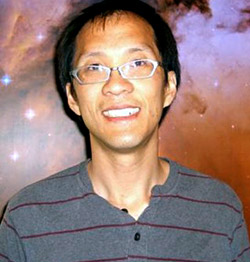MILWAUKEE – Philip Chang, an assistant professor of physics at the University of Wisconsin-Milwaukee, has received an Early Career Development (CAREER) Award from the National Science Foundation (NSF).

Chang’s work involves a highly interdisciplinary approach to a problem in the study of a class of galaxies called TeV blazars. These blazars produce prodigious jets of extreme high-energy radiation, called tera-electron-volt gamma rays. The rays are detected by ground-based, very high-energy gamma-ray telescopes. Present theory predicts that a manifestation of this radiation should also be detected by space-based gamma-ray telescopes, but in fact this has not been observed.
Chang and his colleagues have applied principles of plasma physics to explain the discrepancy in the astronomical observations. Their findings suggest that the energy from the blazars is being absorbed by the intergalactic medium, the vanishingly thin soup of particles, or plasma, that permeates the universe.
This absorption could have cosmological implications: Chang predicts the absorption will lead to heating of the intergalactic medium, which would have an important influence on the structure of the universe, including early galaxy formation.
“This work is somewhat controversial,” Chang observes, “largely because the sort of plasma physics we’re using hasn’t been applied to cosmological questions like this before.”
The CAREER grant will support Chang’s analysis of just how intergalactic plasma can absorb the blazar energy, and extend investigation into the implications of his work for our understanding of the structure of the universe.
CAREER grants are the NSF’s most prestigious grants for younger researchers. They support the career development of teacher-scholars who are most likely to become the academic leaders of this century.
Chang earned his PhD in physics from the University of California Santa Barbara. His post-doctoral appointments include fellowships at the University of California Berkeley and the Canadian Institute for Theoretical Astrophysics.
###
Contact: Philip Chang, pchang@uwm.edu, (414) 229-2590